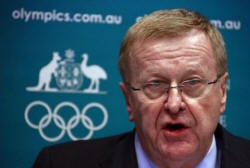|
 Prognosis
for Rio Olympics 'much better': IOC's Coates Prognosis
for Rio Olympics 'much better': IOC's Coates
 Send a link to a friend
Send a link to a friend
[August 05, 2014]
By Nick Mulvenney
SYDNEY (Reuters) - Australia's Olympic
chief John Coates, who in April branded preparations for the 2016 Rio de
Janeiro Olympics as the worst ever, said on Tuesday the prognosis was
now "much, much better".
|
|
 Speaking at an event to mark two years until the start of the Rio
Games, the International Olympic Committee (IOC) vice president said
Brazil's successful hosting of the soccer World Cup in June and July
had been reassuring. Speaking at an event to mark two years until the start of the Rio
Games, the International Olympic Committee (IOC) vice president said
Brazil's successful hosting of the soccer World Cup in June and July
had been reassuring.
"I wasn't there but all of the reports to the IOC were good,"
Coates, who is a member of the IOC's coordination commission for the
Rio Games, told a news conference in Sydney.
"We had concerns about the airport and getting around but that all
worked, the transport worked.
"It's a different event ... but over the last two months they've
really put their foot to the pedal.
"We're back there officially at the end of September for another
report but the prognosis is much, much better."

The first Games on the South American continent have been plagued by
delays, rising costs and bad communication between different levels
of the Brazilian government and organizers, prompting criticism from
international sports federations.
Coates said he had received reports from the ongoing sailing test
event in Rio that the water quality issue he had raised was being
addressed.
He was also encouraged that a private construction firm had been
brought in to work on building the Olympic Park, while tenders had
finally been awarded and work started on the Deodoro venue cluster,
where 11 sports will take place.
LOTS OF UNKNOWNS
Australia's Chef de Mission for the Rio Games Kitty Chiller said
there were still problems with planning for the seven sports to be
held in the Copocabana cluster, where Australia expects to have
about 100 athletes competing.
"It will go down to wire and Rio does have a lot to do," she said.
"It has been difficult for us at the AOC to plan because of some
unknowns in Rio and the big one is the Copocabana zone.
"I've done the trip from the village to Copocabana in 34 minutes,
I've also done it in 2 1/4 hours. We can't have our athletes
traveling 2 1/4 hours each way.
[to top of second column] |

"So we need to rely on roads being built and infrastructure being
completed to be able to plan appropriately and a lot of those things
are unknown at the moment."
Australia expects to send a team of around 476 athletes to Rio in
2016 and have retained the target of a finish in the top five of the
medals table, a goal they failed to reach in London in 2012 when
they finished 10th.
The final medal tally would not be the only objective, Chiller said.
A review of the Australia swimming team after London detailed slack
management, a "culturally toxic" environment, abuse of alcohol and
prescription drugs as well as flouting of curfews and bullying.
Perhaps with that in mind, Chiller said there would be an education
program for athletes aimed at imbuing them with a sense of the
history of Australia's involvement in the Games.
"It's not only about top five," Chiller said. "One of the other
objectives is for every athlete and official in that team to have a
life's best experience.

"It's important for our athletes to recognize the importance of team
unity, to recognize the importance of the strong culture and values
that underpin the Games and what Olympism is all about."
(Editing by Peter Rutherford)
[© 2014 Thomson Reuters. All rights
reserved.]
Copyright 2014 Reuters. All rights reserved. This material may not be published,
broadcast, rewritten or redistributed. |